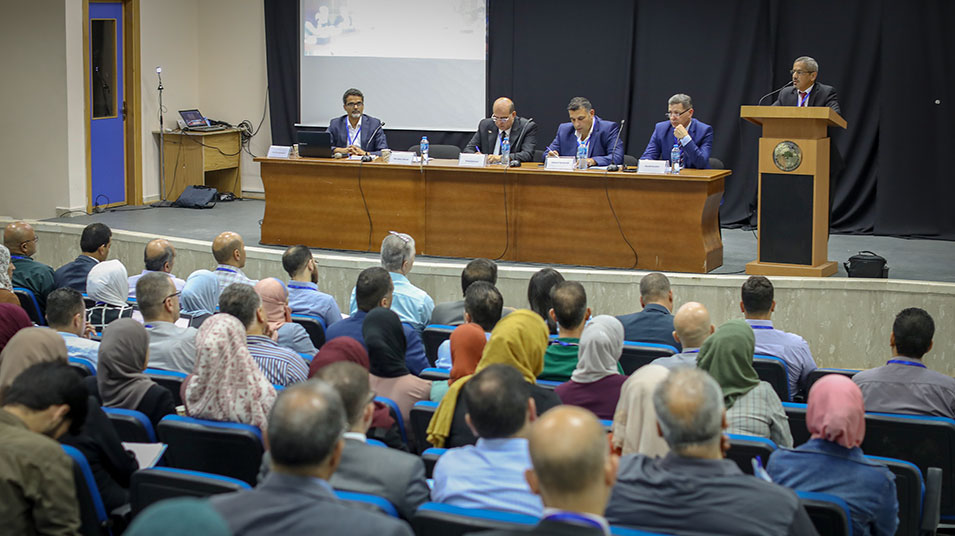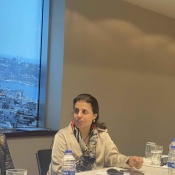Palestinian, international professors wrap up Transforming Assessment Practices project
Professors and faculty members from Palestinian and European universities presented in a national dissemination workshop, held on Birzeit University’s campus on Saturday, September 7, 2019, the results of the Transforming Assessment Practices in Large Enrollment First Year Education (TAP) project, a three-year Erasmus-Plus project that aims to modernize student evaluation schemes in Palestinian universities.
Funded by the European Union, TAP comprises teams from the Palestinian institutes of higher education An-Najah National University, Birzeit University, Palestine Polytechnic University, Al-Aqsa University, and University College of Applied Sciences, as well as the Accreditation and Quality Assurance Commission in Palestine and teams from the University of Alicante, Spain; the Slovak University of Technology, Bratislava; University College Cork, Ireland; and the Greek NGO Four Elements.
The project aims to refine and develop assessment practices in large-enrollment modules at Palestinian universities by integrating technological tools and advancements into student evaluation procedures.
In the workshop’s opening session ⎯ chaired by Ahmad Aljanazrah, dean of Birzeit University’s Faculty of Education ⎯ Khalid Swaileh, the university’s vice president for academic affairs, stressed the importance of enhancing assessment practices at Palestinian higher education institutions, stating that this aspect of the educational process has received limited attention in university development projects.
“TAP,” Swaileh added, “reverses that trend by transforming assessment practices into learning mechanisms through which students receive nearly instant feedback on their academic performance.”
Swaileh emphasized the project’s positive impact on learning environments at universities and higher education institutions, noting that the procedures and schemes developed under TAP are based on modern pedagogical theories that emphasize cooperative and interactive learning.
Nedal Jayousi, director of the National Erasmus+ Office in Palestine, lauded TAP’s focus on integrating technology into student-evaluation practices as a unique, progressive step that will figure greatly in developing higher education in Palestine. He mentioned that the project opens paths to the redevelopment of curricula, placing modern assessment practices at their core.
Mua'amar Ishteiwi, director of the Accreditation and Quality Assurance Commission, said that the project helps create a national higher education policy in Palestine that is guided by modern student-assessment policies and procedures. He praised the project for facilitating the dissemination of student- and instructor performance feedback in classrooms and across universities.
Abdel Karim Daragmeh, the TAP project manager, gave a brief overview of the program’s goals and achievements. Under TAP, he noted, the participating professors and instructors have redesigned 10 higher education modules across a range of professional degree programs to include better assessment practices and have trained 20 teachers and practitioners to lead formative assessment procedures and policies in large-enrollment classes.
“The teams were able to institutionalize technologically advanced assessment practices that facilitate student feedback dissemination at Palestinian higher education institutions,” Daragmeh added.
The workshop’s first session, chaired by Daragmeh, featured keynote presentations by Marian McCarthy, the vice president for teaching and learning at Cork University, Ireland, who discussed academic assessment as learning paradigms, and Waleed Sweileh, ex-director of the Quality Assurance and Accreditation Commission, who explored how assessment fits into the commission’s accreditation requirements.
The second session, chaired by Adnan Shehadeh, featured Mohammad Qneibi from An-Najah National University who discussed using Socrative, a digital student-assessment tool for formative and summative feedback, as well as Aziz Shawabkeh, Mousa Khaldi, and Hasan Abdelkareem, all from Birzeit University, who presented their experience in using online testing and Padlet — an online bulletin board — to support teamwork and meaningful learning.
The third session, chaired by Mohammad Qneibi, featured Adnan Shehadeh from Palestine Polytechnic University who discussed the results of the national baseline study on assessment practices in higher education, as well as Ester Boldrini from the University of Alicante and Daragmeh, who analyzed the project’s pre- and post-evaluation results.







